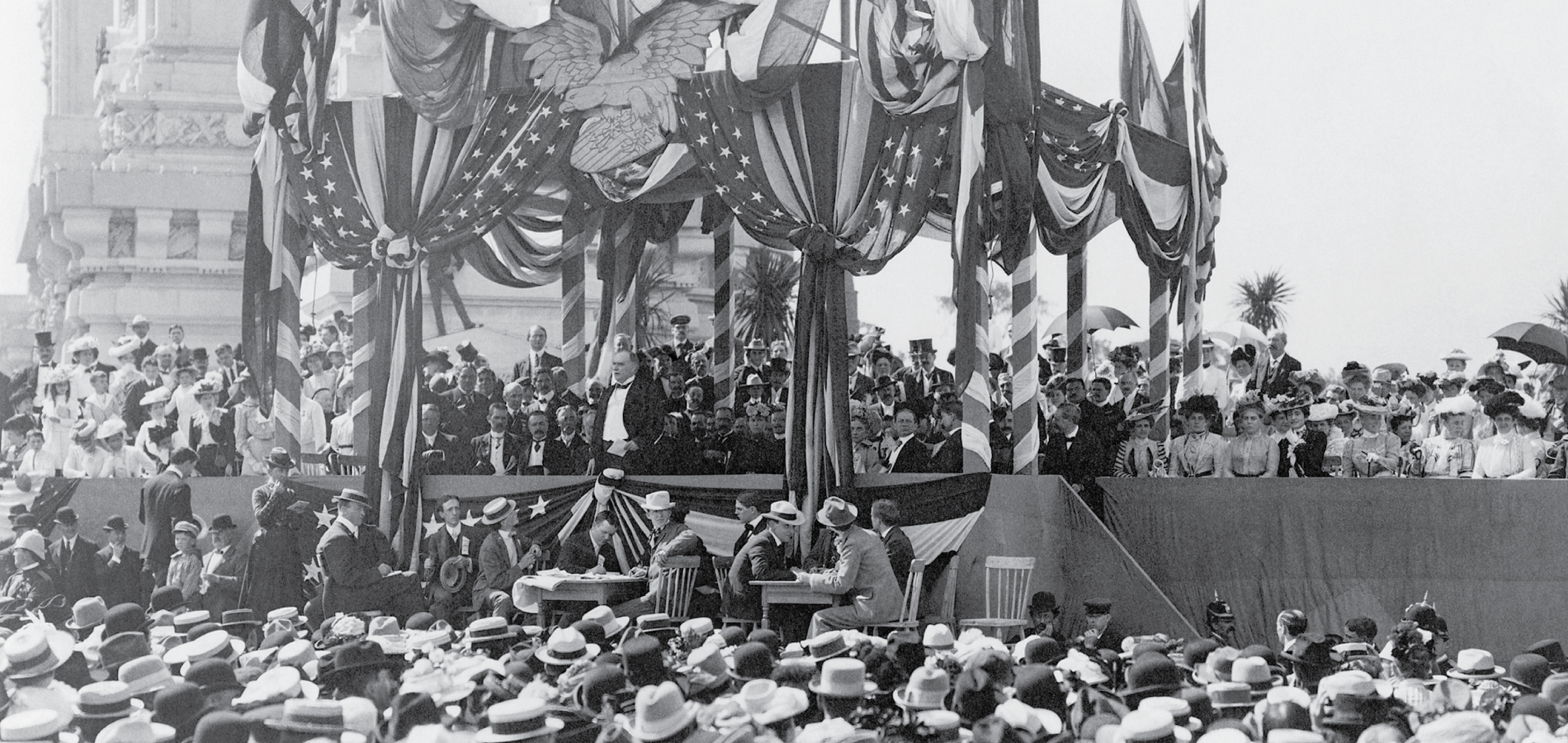In honor of Black History Month, this month’s Secret of the Serial Set dives into a piece of legislation that was a milestone in the civil rights movement: the Civil Rights Act of 1964.[1]To enforce the constitutional right to vote, to confer jurisdiction upon the district courts of the United States to provide injunctive relief against discrimination in public accommodations, to authorize the Attorney General to institute suits to … Continue reading This act was signed into law by then-President Lyndon B. Johnson on July 2, 1964. However, the journey the bill undertook in order to finally make its way to the president’s desk was not an easy one, requiring negotiation, compromise, and strategy to finally pass in the House and Senate.
JFK and a Stagnant Bill
Before John F. Kennedy assumed the presidency in 1960, Senate Majority Leader Lyndon B. Johnson helped pass the Civil Rights Act of 1957[2]“Protection of civil rights.” U.S. Congressional Serial Set, , 1957, p. 1-60. HeinOnline, https://heinonline.org/HOL/P?h=hein.usccsset/usconset22550&i=1751. This document is located in HeinOnline’s U.S. … Continue reading in the Senate. The bill was fairly useless, as the number of compromises needed to pass the bill watered down any real change it could have enacted, but it did help pave the way for stronger legislation moving forward. Although JFK did want to pass a new civil rights bill while in office, he ultimately decided to tread cautiously—he was also trying to pass a tax reform bill that he was afraid would be jeopardized by a push for controversial civil rights legislation.
However, he soon realized that swift action was needed[3]“Message from the President relative to civil rights.” U.S. Congressional Serial Set, , 1963, p. 1-24. HeinOnline, https://heinonline.org/HOL/P?h=hein.usccsset/usconset22072&i=5. This document is located in … Continue reading—on May 2, 1963, law enforcement brutally attacked peaceful protestors marching for desegregation, including school children. Then came the March on Washington for Jobs and Freedom, where Martin Luther King, Jr. made his famous “I have a dream”[4]110 Cong. Rec. 11051 (1964). This document is located in HeinOnline’s U.S. Congressional Documents database. speech. A month later, Ku Klux Klan members bombed the 16th Street Baptist Church in Birmingham, killing four young Black girls. The Civil Rights Act of 1963[5]“Civil rights act of 1963. 2 pts.” U.S. Congressional Serial Set, , 1963, p. 1-32. HeinOnline, https://heinonline.org/HOL/P?h=hein.usccsset/usconset22426&i=1409. This document is located in HeinOnline’s U.S. … Continue reading was being developed in Congress, but it ultimately wasn’t getting far because it was too strong for conservatives and too weak for liberals.
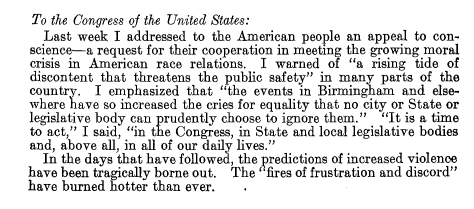
Then, on November 22, 1963, JFK was assassinated[6]“Memorial addresses in Congress and tributes in eulogy of John Fitzgerald Kennedy.” Congressional Serial Set, , 1964, p. [iii]-912. HeinOnline, https://heinonline.org/HOL/P?h=hein.usccsset/usconset51637&i=1. This … Continue reading in Dallas, Texas, leaving the country in shock and shambles.
Taking Charge
Five days after JFK’s assassination, now-President Lyndon B. Johnson addressed Congress and made his stance on the civil rights bill known. Claiming that the best way to honor JFK’s memory was to pass the civil rights bill, he stated, “We have talked long enough in this country about equal rights. We have talked for 100 years or more. It is time now to write the next chapter, and to write it in the books of law.”[7]“Address of the President (Johnson), delivered before joint session.” U.S. Congressional Serial Set, , 1963, p. 1-4. HeinOnline, https://heinonline.org/HOL/P?h=hein.usccsset/usconset22072&i=1403. This document is … Continue reading
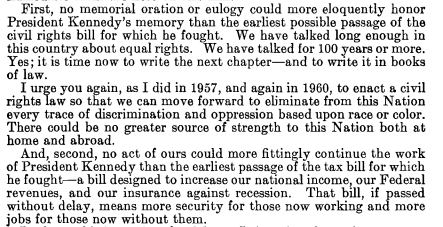
However, it was not going to be easy. Congress was thoroughly divided on the passage of a civil rights bill. In particular, Southern Democrats were staunchly against it. In fact, for several decades, Republicans had a stronger voting record on civil rights legislation than did Democrats, as evidenced by the chart below:[8]“Record of press conference statements made by Senator Everett McKinley Dirksen and Representative Charles A. Halleck for Joint Senate-House Republican Leadership.” U.S. Congressional Serial Set, , 1962, p. … Continue reading
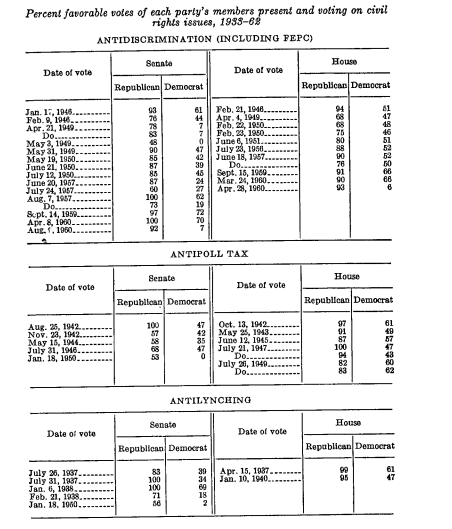
Nonetheless, LBJ was determined. He met with members of the National Association for the Advancement of Colored People (NAACP) to encourage them to lobby for the Civil Rights Act. He spoke with businessmen, labor leaders, civil rights leaders including MLK Jr., even the publisher of The Washington Post to put pressure on representatives to sign a discharge petition, which would move the bill out of the Rules Committee where it was sitting stagnant under conservative Chairman Howard W. Smith. Afraid of the discharge petition passing, Chairman Smith agreed to hold hearings on the civil rights bill.
Taxes and Civil Rights
At the same time, LBJ was determined to get JFK’s tax bill passed, and he didn’t want it to be threatened by negotiations over the civil rights act. The tax bill was currently in the hands of the Finance Committee, chaired by Harry Byrd of Virginia, who was also opposed to the civil rights bill. LBJ treated Byrd to a lavish lunch, during which they agreed that if Johnson could reduce his budget to below $100 billion, Byrd would release the tax bill[9]“Annual report of Secretary of Treasury on state of finances, fiscal year 1964.” U.S. Congressional Serial Set, , 1965, p. I-712. HeinOnline, https://heinonline.org/HOL/P?h=hein.usccsset/usconset51154&i=280. This … Continue reading for debate. And soon, the House passed the Civil Rights Act, despite Chairman Smith’s sudden proposal to amend Title VII of the act, dealing with equal employment, to include sex alongside race to protect women as well as African Americans. Whether or not Smith actually cared about adding women to the bill or if it was an attempt to sabotage it is up for debate.
As the bill moved to the Senate, LBJ arranged for Senator Hubert Humphrey to take charge of the bill and ordered him to persuade Senate Minority Leader Everett Dirksen[10]“Republican report of Senator Everett McKinley Dirksen, minority leader, for 88th Congress, 1st session.” U.S. Congressional Serial Set, , 1963, p. I-38. HeinOnline, … Continue reading to support it—with Southern Democrats opposing the bill, they would need votes from Senate Republicans. He notoriously stated, “You get in there to see Dirksen. You drink with Dirksen! You talk with Dirksen! You listen to Dirksen!” And it worked. Humphrey was able to get Dirksen on his side.[11]“Republican report of Senator Everett McKinley Dirksen, minority leader, for 88th Congress, 2d session.” U.S. Congressional Serial Set, , 1964, p. I-30. HeinOnline, … Continue reading
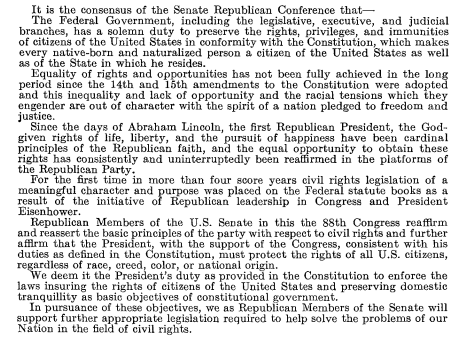
The Final Steps & Results
The Senate debate over the civil rights bill began on March 26, 1964, and as expected resulted in a filibuster, and revisions to the bill ensued. After a cloture vote,[12]“Senate cloture rule.” U.S. Congressional Serial Set, , 1963, p. I-48. HeinOnline, https://heinonline.org/HOL/P?h=hein.usccsset/usconset24851&i=442. This document is located in HeinOnline’s U.S. Congressional … Continue reading the Senate passed the civil rights bill 73-27.[13]“Republican report of Senator Everett McKinley Dirksen, minority leader, for 88th Congress, 2d session.” U.S. Congressional Serial Set, , 1964, p. I-30. HeinOnline, … Continue reading The House voted 289-126 to pass the Senate version of the bill on July 2, and that same day LBJ signed it into law.
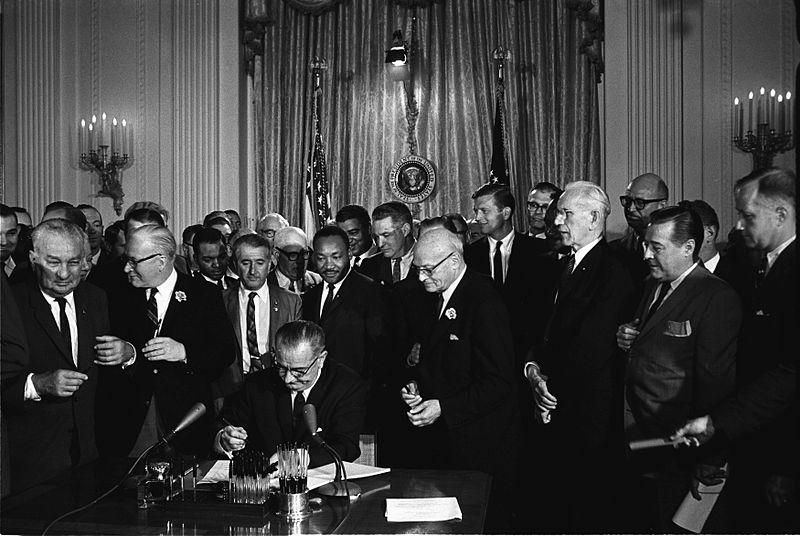
The most notable pieces of the new legislation included:
- Title II:[14]To enforce the constitutional right to vote, to confer jurisdiction upon the district courts of the United States to provide injunctive relief against discrimination in public accommodations, to authorize the Attorney General to institute suits to … Continue reading Prohibited discrimination in public accommodations.
- Title III:[15]To enforce the constitutional right to vote, to confer jurisdiction upon the district courts of the United States to provide injunctive relief against discrimination in public accommodations, to authorize the Attorney General to institute suits to … Continue reading Permitted the Justice Department to sue segregated public facilities that were owned or operated by state or local governments
- Title IV:[16]To enforce the constitutional right to vote, to confer jurisdiction upon the district courts of the United States to provide injunctive relief against discrimination in public accommodations, to authorize the Attorney General to institute suits to … Continue reading Allowed the Attorney General to sue segregated public schools and colleges
- Title VI:[17]To enforce the constitutional right to vote, to confer jurisdiction upon the district courts of the United States to provide injunctive relief against discrimination in public accommodations, to authorize the Attorney General to institute suits to … Continue reading Banned discrimination from programs or activities receiving federal financial assistance
- Title VII:[18]To enforce the constitutional right to vote, to confer jurisdiction upon the district courts of the United States to provide injunctive relief against discrimination in public accommodations, to authorize the Attorney General to institute suits to … Continue reading Guaranteed equal employment opportunity.
This act also helped lay the groundwork for the subsequent Voting Rights Act of 1965,[19]“Message from the President relative to civil rights.” U.S. Congressional Serial Set, , 1967, p. 1-12. HeinOnline, https://heinonline.org/HOL/P?h=hein.usccsset/usconset21608&i=486. This document is located in … Continue reading as well as for future legislation protecting other minority groups such as women, the LGBTQ+ community, and people with disabilities.
Help Us Complete the Project
Secrets of the Serial Set is an exciting and informative blog series from HeinOnline dedicated to unveiling the wealth of American history found in the United States Congressional Serial Set. Documents from additional HeinOnline databases have been incorporated to supplement research materials for non-U.S. related events discussed.
These posts have been so informative; they enable both patrons and staff to understand what the Serial Set is and how invaluable it is to all kinds of research.
The U.S. Congressional Serial Set is considered an essential publication for studying American history. Spanning more than two centuries with more than 17,000 bound volumes, the records in this series include House and Senate documents, House and Senate reports, and much more. The Serial Set began publication in 1817 with the 15th Congress, 1st session. U.S. congressional documents prior to 1817 are published as the American State Papers.
The Serial Set is an ongoing project in HeinOnline, with the goal of adding approximately four million pages each year until the archive is completed. To date, we’ve completed 95% of the project! View the current status of HeinOnline’s Serial Set project below.
If your library holds all or part of the Serial Set, and you are willing to assist us, please contact Shannon Hein at 716-882-2600 or shein@wshein.com. HeinOnline would like to give special thanks to the following libraries for their generous contributions which have resulted in the steady growth of HeinOnline’s U.S. Congressional Serial Set.
- Buffalo & Erie County Public Library
- University at Buffalo
- Villanova Law Library
- Wayne State University
- University of Utah
- UC Hastings
- University of Montana
- Law Library of Louisiana
- George Washington University
- University of Delaware
- Southern Illinois University, Morris Library
- University of Wisconsin Oshkosh
We will continue to need help from the library community to complete this project. For a complete list of remaining missing volumes of the Serial Set, please email our Marketing Team at marketing@wshein.com.
Interested in Further Research?
To learn more about the expansion of civil rights in America, check out our Civil Rights and Social Justice database, one of the collections within Social Justice Suite which is included in all HeinOnline Core subscriptions and free of charge to any interested organization!
HeinOnline Sources[+]
| ↑1 | To enforce the constitutional right to vote, to confer jurisdiction upon the district courts of the United States to provide injunctive relief against discrimination in public accommodations, to authorize the Attorney General to institute suits to protect constitutional rights in public facilities and public education, to extend the Commission on Civil Rights, to prevent discrimination in federally assisted programs, to establish a Commission on Equal Employment Opportunity, and for other purposes., Public Law 88-352, 88 Congress. 78 Stat. 241 (1964). HeinOnline, https://heinonline.org/HOL/P?h=hein.statute/sal078&i=283. This act is located in HeinOnline’s U.S. Statutes at Large database. |
|---|---|
| ↑2 | “Protection of civil rights.” U.S. Congressional Serial Set, , 1957, p. 1-60. HeinOnline, https://heinonline.org/HOL/P?h=hein.usccsset/usconset22550&i=1751. This document is located in HeinOnline’s U.S. Congressional Serial Set database. |
| ↑3 | “Message from the President relative to civil rights.” U.S. Congressional Serial Set, , 1963, p. 1-24. HeinOnline, https://heinonline.org/HOL/P?h=hein.usccsset/usconset22072&i=5. This document is located in HeinOnline’s U.S. Congressional Serial Set database. |
| ↑4 | 110 Cong. Rec. 11051 (1964). This document is located in HeinOnline’s U.S. Congressional Documents database. |
| ↑5 | “Civil rights act of 1963. 2 pts.” U.S. Congressional Serial Set, , 1963, p. 1-32. HeinOnline, https://heinonline.org/HOL/P?h=hein.usccsset/usconset22426&i=1409. This document is located in HeinOnline’s U.S. Congressional Serial Set database. |
| ↑6 | “Memorial addresses in Congress and tributes in eulogy of John Fitzgerald Kennedy.” Congressional Serial Set, , 1964, p. [iii]-912. HeinOnline, https://heinonline.org/HOL/P?h=hein.usccsset/usconset51637&i=1. This document is located in HeinOnline’s U.S. Congressional Serial Set database. |
| ↑7 | “Address of the President (Johnson), delivered before joint session.” U.S. Congressional Serial Set, , 1963, p. 1-4. HeinOnline, https://heinonline.org/HOL/P?h=hein.usccsset/usconset22072&i=1403. This document is located in HeinOnline’s U.S. Congressional Serial Set database. |
| ↑8 | “Record of press conference statements made by Senator Everett McKinley Dirksen and Representative Charles A. Halleck for Joint Senate-House Republican Leadership.” U.S. Congressional Serial Set, , 1962, p. I-54. HeinOnline, https://heinonline.org/HOL/P?h=hein.usccsset/usconset22390&i=519. This document is located in HeinOnline’s U.S. Congressional Serial Set database. |
| ↑9 | “Annual report of Secretary of Treasury on state of finances, fiscal year 1964.” U.S. Congressional Serial Set, , 1965, p. I-712. HeinOnline, https://heinonline.org/HOL/P?h=hein.usccsset/usconset51154&i=280. This document is located in HeinOnline’s U.S. Congressional Serial Set database. |
| ↑10 | “Republican report of Senator Everett McKinley Dirksen, minority leader, for 88th Congress, 1st session.” U.S. Congressional Serial Set, , 1963, p. I-38. HeinOnline, https://heinonline.org/HOL/P?h=hein.usccsset/usconset24851&i=985. This document is located in HeinOnline’s U.S. Congressional Serial Set database. |
| ↑11, ↑13 | “Republican report of Senator Everett McKinley Dirksen, minority leader, for 88th Congress, 2d session.” U.S. Congressional Serial Set, , 1964, p. I-30. HeinOnline, https://heinonline.org/HOL/P?h=hein.usccsset/usconset22098&i=1413. This document is located in HeinOnline’s U.S. Congressional Serial Set database. |
| ↑12 | “Senate cloture rule.” U.S. Congressional Serial Set, , 1963, p. I-48. HeinOnline, https://heinonline.org/HOL/P?h=hein.usccsset/usconset24851&i=442. This document is located in HeinOnline’s U.S. Congressional Serial Set database. |
| ↑14 | To enforce the constitutional right to vote, to confer jurisdiction upon the district courts of the United States to provide injunctive relief against discrimination in public accommodations, to authorize the Attorney General to institute suits to protect constitutional rights in public facilities and public education, to extend the Commission on Civil Rights, to prevent discrimination in federally assisted programs, to establish a Commission on Equal Employment Opportunity, and for other purposes., Public Law 88-352, 88 Congress. 78 Stat. 241 (1964). HeinOnline, https://heinonline.org/HOL/P?h=hein.statute/sal078&i=285. This document is located in HeinOnline’s U.S. Congressional Serial Set database. |
| ↑15 | To enforce the constitutional right to vote, to confer jurisdiction upon the district courts of the United States to provide injunctive relief against discrimination in public accommodations, to authorize the Attorney General to institute suits to protect constitutional rights in public facilities and public education, to extend the Commission on Civil Rights, to prevent discrimination in federally assisted programs, to establish a Commission on Equal Employment Opportunity, and for other purposes., Public Law 88-352, 88 Congress. 78 Stat. 241 (1964). HeinOnline, https://heinonline.org/HOL/P?h=hein.statute/sal078&i=288. This act is located in HeinOnline’s U.S. Statutes at Large database. |
| ↑16 | To enforce the constitutional right to vote, to confer jurisdiction upon the district courts of the United States to provide injunctive relief against discrimination in public accommodations, to authorize the Attorney General to institute suits to protect constitutional rights in public facilities and public education, to extend the Commission on Civil Rights, to prevent discrimination in federally assisted programs, to establish a Commission on Equal Employment Opportunity, and for other purposes., Public Law 88-352, 88 Congress. 78 Stat. 241 (1964). HeinOnline, https://heinonline.org/HOL/P?h=hein.statuthttps://heinonline.org/HOL/P?h=hein.statute/sal078&i=288. This act is located in HeinOnline’s U.S. Statutes at Large database. |
| ↑17 | To enforce the constitutional right to vote, to confer jurisdiction upon the district courts of the United States to provide injunctive relief against discrimination in public accommodations, to authorize the Attorney General to institute suits to protect constitutional rights in public facilities and public education, to extend the Commission on Civil Rights, to prevent discrimination in federally assisted programs, to establish a Commission on Equal Employment Opportunity, and for other purposes., Public Law 88-352, 88 Congress. 78 Stat. 241 (1964). HeinOnline, https://heinonline.org/HOL/P?h=hein.statute/sal078&i=294. This act is located in HeinOnline’s U.S. Statutes at Large database. |
| ↑18 | To enforce the constitutional right to vote, to confer jurisdiction upon the district courts of the United States to provide injunctive relief against discrimination in public accommodations, to authorize the Attorney General to institute suits to protect constitutional rights in public facilities and public education, to extend the Commission on Civil Rights, to prevent discrimination in federally assisted programs, to establish a Commission on Equal Employment Opportunity, and for other purposes., Public Law 88-352, 88 Congress. 78 Stat. 241 (1964). HeinOnline, https://heinonline.org/HOL/P?h=hein.statute/sal078&i=295. This act is located in HeinOnline’s U.S. Statutes at Large database. |
| ↑19 | “Message from the President relative to civil rights.” U.S. Congressional Serial Set, , 1967, p. 1-12. HeinOnline, https://heinonline.org/HOL/P?h=hein.usccsset/usconset21608&i=486. This document is located in HeinOnline’s U.S. Congressional Serial Set database. |


